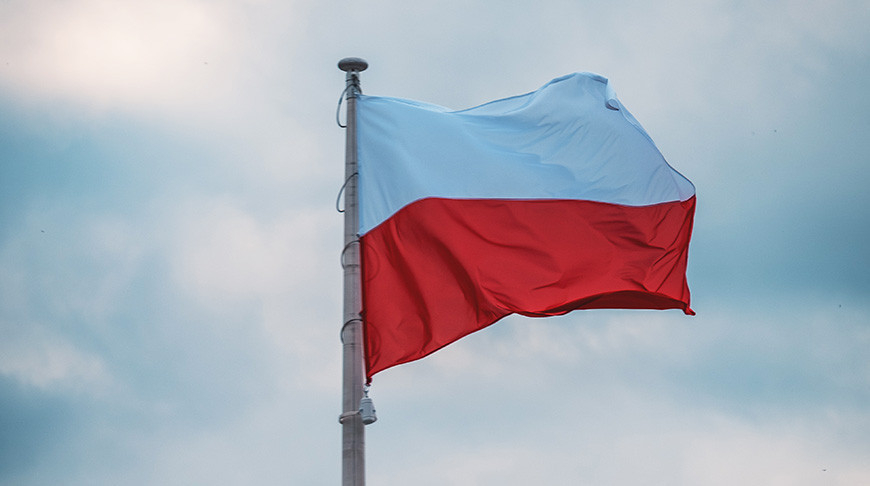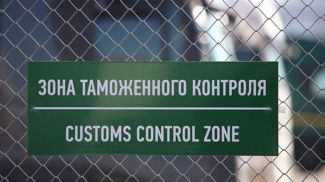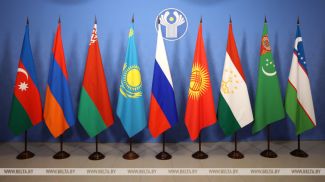
Photos from Unsplash
In the game of escalation, which was started by the USA and sustained by the UK, a special role is assigned to Poland. Warsaw was kindly given the fuse and matches. Strike once - and get a minute of glory. However, it is difficult to even imagine what will happen next.
There is no doubt that the Poles are just as interested in weakening Europe and redistributing spheres of influence as the Americans or the British are. But unlike their Anglo-Saxon friends, Poland will not be able to hide behind the English Channel or the Atlantic Ocean. If they start a fire, they will find themselves ablaze, too. Another question is whether Warsaw still has the room for maneuver.
BelTA has already analyzed in detail how the USA unleashed a war against Europe and what place the UK has in the American strategy. This time, we will try to understand what plans Washington has for Poland and what Warsaw really wants to get.
Figureheads are being expended
After Brexit, Poland became the U.S. outpost in the European community. Such collaboration seemed mutually beneficial until a certain point.
Warsaw could count on support and protection from the United States, which allowed it to openly oppose Brussels or Berlin. At the same time, the Americans were interested in propping up Poland's position in the EU, since this gave them the opportunity to directly influence the policy of the European community, promoting their vision through Warsaw and preventing initiatives that could run afoul of the U.S. interests.
In February 2023, Polish President Andrzej Duda announced that the “greater American presence in Europe” would become the slogan of the Polish EU presidency in 2025. “Greater American presence in Europe, closer ties between the EU and the USA on economy and security, and everything that is extremely important to us,” the Polish leader emphasized.
In response, the USA said that they want to see Poland as a leader of the European Union. “Today, we very much want Poland to become a leader in the European Union. This is the stated goal of the new Polish government. This is encouraging for us,” said Assistant Secretary for European and Eurasian Affairs James O'Brien.

Pay attention that Brussels was not outraged by the U.S. interference in the internal affairs of the EU. Paris and Berlin, which the U.S. Department of State had apparently discarded by then, remained silent. It is not surprising. As Politico has recently remarked, French President Emmanuel Macron is not followed by others, and German Chancellor Olaf Scholz is a very weak leader.
Yet, the question is what kind of leader the current Polish Prime Minister Donald Tusk aspires to be. President Duda can be disregarded - his presidential term is coming to an end. In addition to that, Duda belongs to the PiS camp, and his Law and Justice (PiS) Party lost to Tusk's coalition in last year's elections. The EU has perceived PiS as a toxic party in recent years, as it has been at loggerheads with both Brussels and the now nominal leaders of the community - Berlin and Paris. However, being propped by America gave confidence to Polish leaders in their bravado,which was aimed, among other things, at undermining the authority of the EU 'imperialists'.
Of course, in such a situation, Poland, led by PiS, could not claim leadership in the European Union. But with the arrival of Tusk, the situation changed. As is known, the incumbent prime minister once headed the European Council, and after that the leading faction of the European Parliament - the European People's Party. From the point of view of Brussels, Tusk is a perfect candidate to be prime minister of Poland. After he came to power, many believed that Tusk would pursue a pro-European, not pro-American policy. This assumption looked quite reasonable. However, there is a “caveat”.
Today, there is virtually no pro-European policy in the European Union. Hungary or Slovakia are trying to reach out to the European community, individual parties and politicians in Germany, France, Austria, and the Netherlands urge the European authorities to come to their senses. But it seems that newly elected people in Brussels, as in most European capitals, are tuned exclusively to the American wave. Therefore, pro-European policy has been completely ousted by pro-American policy. And the assumption that Tusk is fighting for the interests of the EU seems like a joke.
Does Warsaw understand this? Of course, it does. For years, Poland has been deliberately playing along with the United States in weakening Europe. And no matter how Tusk maneuvered during his first term as prime minister, Poland was already an implementer of Washington's policy. And, probably, it was then that the United States gave the Polish elites hope for their future leadership in the EU. Even if it was a nominal one - under close guidance of the United States.
However, the events of recent months suggest that this hope is futile. The escalation of the Ukrainian conflict, including events in Kursk Oblast, may indicate that Washington is switching to plan 'B', in which puppet leaders do not rule, but go to waste.
For whom the final gong tolls
When it comes to what the United States is doing, the biggest question is probably not about its goals, but about the timing. In other words, it is not about how far the Washington hawks are ready to fly, but about when the final gong will toll.
If you analyze the USA's European policy over the past 15-20 years, you will see how consistently they are pushing Europe to the edge of the abyss. Cultivation of hatred and Russophobia in European society, 'pay-to-play' politicians and even entire governments in the EU countries, the introduction of NGOs, color revolutions, military provocation of migrant crises, NATO expansion and unprecedented militarization of the eastern flank of the alliance. Step by step, the United States was working towards its goals.
And the American goals are absolutely clear. They are premised on the fact that the United States does not tolerate competition, which is also pretty understandable. Competition is a direct threat to dominance. Without this dominance - be it political, economic or military - the Americans will not be able to pump resources out of third countries, silence those who they dislike, maintain the dollar monopoly and continue to live a lavish life, with a national debt of $35 trillion.
Over the past quarter of a century, the USA has got three major competitors at once: the EU with a strong economy and currency, Russia with vast resources and military capabilities, and China with a powerful and incrementally growing economy and top-notch technologies.
We have already written about the USA unleashing an anti-European war together with Great Britain. First, they orchestrated Brexit, trying to bring about internal political discord in the European Union. And then they cut the EU off from Russian resources by launching the Ukrainian project. In one fell swoop, the USA struck the economies of the EU and Russia. But Moscow managed to quickly redirect its exports to the markets of friendly nations, and those were quite a few, to the surprise of the United States.
The USA probably expected that economically isolated Russia would throw in the towel in a couple of months. In that case, Washington could move on to the next stage - a hybrid war against China. First, an economic war involving sanctions, and then a hot one - opening several fronts along the perimeter. Of course, using false flag operations.
By the way, the United States probably planned to open several fronts against Russia. For this purpose, they needed Belarus in 2020. Today, Georgia found itself under enormous pressure for the same reason. But the American plans have so far succeeded only in the EU, where the European elites, on their own initiative, put the future of their peoples at stake - and lost.
It is obvious to Washington that without the United States, the European allies' enthusiasm for sustaining the conflict will not last long. The Americans realized this last year. In the fall of 2023, former Commander-in-Chief of the Armed Forces of Ukraine Valery Zaluzhny admitted that the situation on the front had reached an impasse. The United States did not want to stand still, but they were not ready to move on to the next phase - a serious escalation and expansion of the conflict. By that time, they got things to do in the Middle East and Africa, where China began to strengthen its positions. Therefore, for a while, the Americans stepped aside, placing the financial burden of the Ukrainian conflict on to the EU.
At first, Brussels was outraged, but in the end they approved the financing for Kiev. However, no one fully understood what part of the funds would go to Ukraine and how much would end up in the pockets of European officials. All this time, the indignant Kiev continued its counter-offensive - only in the opposite direction.

China and other countries of the Global South interested in ending the conflict nearly succeeded in bringing Kiev and Moscow to the negotiating table. And the U.S. long-term strategy would have gone down the drain.
Of course, the Americans have already reaped their dividends from investing in the anti-European war. The USA made money selling weapons and LNG to Europe, cut Russia off from the European market, and weakened the European Union economically and politically. And they also created a new hotbed of instability on the European continent - after all, without proper control and huge investments, Ukraine might turn into another Afghanistan. Corruption, banditry, arms smuggling on an unimaginable scale... Isn't this an ideal environment for the emergence of extremist and terrorist groups? Right next door to Russia and the EU.
Americans could have stopped at this. But Washington understands that in a couple of years, the wall of hostility will fall, and the Western Europe and Eastern Europe will come to terms again - if not politicians, then business people for sure. While the world continues to move towards multipolarity, new centers of power will emerge and new growth points will form, the USA will have to watch the fall of American dominance. If Washington hawks have nightmares, this is definitely one of them.
Therefore, Washington will most likely choose another path, which is escalation. The UK that is playing its own games inside the American game, is ready to run ahead of the Americans on this track. The stakes are rising. If this game continues, Poland will be next to be invited to the battlefield. And when that happens, the writing will be already on the wall.
In the Anglo-Saxon meat grinder
One of the peculiarities of the Ukrainian conflict is that the degree of escalation is increasing gradually. And perhaps it is not even about testing Russia's 'red lines', but about striving to achieve goals with the least effort. First sanctions, then heavy offensive equipment, long-range missiles, fighters. In the third year of the conflict, the West started contemplating sending its troops into Ukraine, outlining its own 'red lines'.
In fact, the United States has only one 'red line' - a nuclear war with Russia. And when the White House says that the United States does not want to get involved in the Ukrainian conflict, you can believe it. But with one caveat - the USA does not want to be directly drawn into the Ukrainian conflict, since this would mean a direct confrontation with a nuclear state. Everything else is quite acceptable for Washington, including a local conflict involving one or more NATO countries. In fact, if the USA opts for the further escalation (the events in Kursk Oblast and Ukrainian drones in the skies over Belarus indicate exactly this), then the expansion of the Ukrainian conflict will be on the agenda.


The United States will have little difficulty in sidestepping NATO’s Article 5 on collective defense. It will be enough to remind everybody that the U.S. involvement threatens the planet with nuclear apocalypse, to promise the Europeans all possible support and to assure them that victory is close - now for sure. However, if by then Donald Trump will be serving as U.S. president, there will be no need to promise anything. After all, Europe has been warned already - if it wanted protection, it needed to spend money on defense. If it did not listen, it is its fault.
The expansion of the Ukrainian conflict at the expense of European countries will benefit the United States. Through the weakening of Russia and the EU, the complete and long-term breakdown of relations between the two parts of Europe, and the opportunity to get rich selling weapons. At the very least, for both the USA and the UK, it is an opportunity to lay a hand on Europe's manufacturing facilities, to poach investors and highly skilled professionals. At most, it is a chance to force the EU economy onto a war footing. After all, for subsequent wars, including with China, the USA will need huge military resources.
Here we come to the main point. At the expense of which countries is it possible to expand the Ukrainian conflict?
An article published in May by the Italian newspaper La Repubblica comes to mind. According to the article, NATO has privately set “red lines”, the crossing of which would lead to the involvement of the alliance's countries in the Ukrainian conflict. One of these lines is direct or indirect interference of a third country in the events in Ukraine. Belarus was mentioned here, whose participation in the conflict NATO allegedly does not rule out.
Yet, it is an interesting logic: Belarus has not participated in the conflict for two years, and may it now change its mind? Or will it be forced to change its mind under certain scenarios developed by NATO? Isn't it for this purpose that terrorists, subversive reconnaissance units and attack drones from Ukraine were sent to Belarus? Minsk knows the answers to these questions and is preparing for any development of events, as head of state Aleksandr Lukashenko has repeatedly said.
On the NATO side, in case of conflict expansion, Poland is the first in line. Probably, the Baltic states will also play a role in the U.S.-UK escalation scenario. If we take a look at the data of the German Institute for Economic Research IFO, the states of the so-called eastern flank among all European NATO countries took the first positions in terms of spending on “defense” last year. Poland is in the lead, Estonia is in third place, Lithuania and Finland share the fourth place. Latvia is also close behind. All these countries spent more than 2% of GDP on defense last year. If we look at the map from this point of view, NATO's eastern border no longer seems like a symbolic line of separation. It now resembles a front line, where military forces are gradually being pulled in from the western side.
Poland, however, has the greatest military potential, compared to other countries on the eastern flank of the alliance. BelTA wrote about the scale of militarization here, which began long before the Russian special operation in Ukraine, two years ago.
Even then, the Polish authorities declared that the country would have the strongest army in Europe. The process of militarization was facilitated by the United States in every possible way. Although, in fact, they should have prevented it. Just as they prevented the idea of developing a unified European army. This idea was put forward by a number of leaders from Charles de Gaulle to Angela Merkel and Emmanuel Macron. The United States could not allow Europe as a whole or any individual country to become militarily self-sufficient. As an alternative, they promoted NATO, which they managed themselves.
If the USA has allowed Poland to build up its military muscles, this means there are plans for applying the Polish fist. For example, in a local non-nuclear conflict. It should be noted that despite close military and political cooperation and the deployment of a significant U.S. contingent in Poland, Warsaw has never succeeded in getting Washington to deploy U.S. nuclear weapons in the country. This did not happen even after Russia's tactical nuclear weapons had been deployed in Belarus. If the danger of a Russian attack on Europe really existed, the deployment of TNWs in Poland would have been a logical step. Well, either there is no danger at all, or the United States have no plans to defend Poland.
The UK will be the first to lobby for throwing Poland into the meat grinder of war. At the bare minimum, they will get rid of a competitor for the title of European leader - the British have their own crown on their heads. At most, London will get an extension of combat activities all the way to Germany's borders. Once the dust settles, the British hope to shape a new political and economic landscape in Europe. What place will Poland, twisted through the Anglo-Saxon meat grinder, take in it?
Poland's leadership test
As noted above, in the case of the United States, the goals are clear, we only need to understand when Washington will move into action. If the United States is ready to activate a new phase of the anti-European war, then, this means Poland, in particular, is approaching a turning point. Polish elites want a lot. But now it is more important for them to understand what they do not want and what they must not allow if the future of their state and people is to be considered a priority.
As for desires and their feasibility, Warsaw claims leadership in Europe – in a political, economical and military sense.
“Poland will regain its position as a leader in the European Union… Poland will build its strength, the position it deserves,” Polish Prime Minister Donald Tusk said last December.

The country's former PiS-led government clashed with European authorities, betting exclusively on the USA. It should be mentioned, however, that Warsaw at that time maintained close ties with the countries of the Visegrad Group (comprising Poland, the Czech Republic, Slovakia and Hungary), as well as with the Baltic states. Thus, a bloc of states was being formed in the EU, which could gain political weight in the future. The positions of the countries in this bloc, however, differed significantly in many important aspects, including with regard to the Ukrainian conflict. After Tusk came to power, the disagreements became even more acute. Especially in the relations between Warsaw and Budapest.
In addition, Tusk was more inclined to the recognized leaders - Berlin and Paris. It is not for nothing that for the last six months there has been a lot of talking about the revival of the “Weimar Triangle” - a tripartite political institution of Germany, France and Poland. “The election results on the Vistula foreshadow a reshuffling of the cards in a united Europe... For the first time in its 32-year history, the Weimar Triangle may turn into a kind of directorate of Europe,” the Polish newspaper Rzeczpospolita wrote.
Tusk himself announced plans to renew the Weimar format. “I would like to emphasize that the Weimar Triangle will be utilized more often,” the prime minister said.
As far as economic leadership is concerned, Warsaw's situation is more complicated here. This is mainly due to the eight-year rule of the previous government. Poland, however, managed to preserve the coal industry, despite severe conflicts with Brussels. On the contrary, Germany, following the green agenda, has actually broken its economy. Moreover, Warsaw has signed a contract with U.S. companies to build a nuclear power plant.
Tusk has recently boasted that Poland had “beaten Germany fair and square” in terms of economic growth. “We are the best compared to all the big EU states, and we have beaten Germany fair and square,” the prime minister said. Amid Berlin's accusations against Warsaw in connection with the attack on Nord Stream, Tusk's words take on a special connotation.
Poland is also interested in developing its transit potential. The customs clearance terminal in Malaszewicze, on Poland's border with Belarus, is called “China's gateway to Europe”. Up to 90% of goods shipped from China to the EU pass through it. Transit goes in the opposite direction as well. Poland benefits greatly from this. Ukraine as an alternative transit corridor is no longer competitive: with the start of the conflict, the Ukrainian land route within China's Belt and Road Initiative was virtually closed.
As for military leadership, the promises to develop the strongest army in Europe speak for themselves. It would suffice to name the contracts with South Korean companies for 1,000 K2 tanks, 288 K239 Chunmoo rocket artillery systems, 672 K9 self-propelled howitzers and 48 FA-50 fighter jets. “The government has gone out of control, buying up everything it can. The problem is that there is no market here,” the Polish newspaper Rzeczpospolita wrote.
Poland is building its army in debt. Polish media have calculated that if South Korean banks lend for military contracts, Warsaw's debt will amount to about $25 billion. Poland buys weapons not only from the Koreans. Billions of U.S. dollars in contracts have been signed with the United States. These billions will have to be paid back.
If the end justifies the means, it would be great to understand what goals Poland is actually pursuing. Whether the political elites of this country realize that after the war, into which the Anglo-Saxon meat grinder is dragging our region, there may be no goals left.
Meeting with U.S. President Joe Biden in March 2024, Tusk thanked the USA “for never forgeting why NATO was established”, but just in case, he quoted excerpts from the preamble of the Washington Treaty, which sets out the mutual promises of the alliance countries.
Tusk voiced quite interesting thoughts during his press conference in Washington, as well as in his interview with Polish journalists. The prime minister characterized the current situation in the world as a pre-war era, but called the possibility of a Russian attack on Poland as unlikely.
He also noted that “Poland bears more responsibility for what is happening in the world than most European countries”. There is no arguing with that, given the role Poles are given in the big Anglo-Saxon game.
Here is what Tusk said when addressing the U.S. president: “Our country is now a stable democracy, predictable for our Allies, on which the security of the whole region hugely depends.”
The day before, the Polish prime minister raised the topic of the region's security while speaking on Polish television. “Only a strong Poland will guarantee the stability of the entire region, and an unstable region will sooner or later mean dramatic consequences for the entire West,” the prime minister said.
Tusk sometimes voices reasonable thoughts. Unfortunately, no reasonable action is visible.
In a peaceful, free Europe, Poland would have every chance of leadership with reasonable authorities. In a peaceful American Europe, Warsaw can only claim to be a viceroy. But at least it would have a chance for the future. In a military Europe, however, no matter what the United States may promise the Poles, Poland will have neither chances nor a future.
A huge powder keg has been laid under the European continent. Poland is holding the matches. Do Poles have the right to choose? Leaders always have a choice - it is the national interests of their state and people. Another thing is that not everyone can become a real leader.
Vita Khanatayeva
BelTA
The expansion of the Ukrainian conflict at the expense of European countries will benefit the United States. Through the weakening of Russia and the EU, the complete and long-term breakdown of relations between the two parts of Europe, and the opportunity to get rich selling weapons. At the very least, for both the USA and the UK, it is an opportunity to lay a hand on Europe's manufacturing facilities, to poach investors and highly skilled professionals. At most, it is a chance to force the EU economy onto a war footing. After all, for subsequent wars, including with China, the USA will need huge military resources.
Here we come to the main point. At the expense of which countries is it possible to expand the Ukrainian conflict?
An article published in May by the Italian newspaper La Repubblica comes to mind. According to the article, NATO has privately set “red lines”, the crossing of which would lead to the involvement of the alliance's countries in the Ukrainian conflict. One of these lines is direct or indirect interference of a third country in the events in Ukraine. Belarus was mentioned here, whose participation in the conflict NATO allegedly does not rule out.
Yet, it is an interesting logic: Belarus has not participated in the conflict for two years, and may it now change its mind? Or will it be forced to change its mind under certain scenarios developed by NATO? Isn't it for this purpose that terrorists, subversive reconnaissance units and attack drones from Ukraine were sent to Belarus? Minsk knows the answers to these questions and is preparing for any development of events, as head of state Aleksandr Lukashenko has repeatedly said.
On the NATO side, in case of conflict expansion, Poland is the first in line. Probably, the Baltic states will also play a role in the U.S.-UK escalation scenario. If we take a look at the data of the German Institute for Economic Research IFO, the states of the so-called eastern flank among all European NATO countries took the first positions in terms of spending on “defense” last year. Poland is in the lead, Estonia is in third place, Lithuania and Finland share the fourth place. Latvia is also close behind. All these countries spent more than 2% of GDP on defense last year. If we look at the map from this point of view, NATO's eastern border no longer seems like a symbolic line of separation. It now resembles a front line, where military forces are gradually being pulled in from the western side.
Poland, however, has the greatest military potential, compared to other countries on the eastern flank of the alliance. BelTA wrote about the scale of militarization here, which began long before the Russian special operation in Ukraine, two years ago.
Even then, the Polish authorities declared that the country would have the strongest army in Europe. The process of militarization was facilitated by the United States in every possible way. Although, in fact, they should have prevented it. Just as they prevented the idea of developing a unified European army. This idea was put forward by a number of leaders from Charles de Gaulle to Angela Merkel and Emmanuel Macron. The United States could not allow Europe as a whole or any individual country to become militarily self-sufficient. As an alternative, they promoted NATO, which they managed themselves.
If the USA has allowed Poland to build up its military muscles, this means there are plans for applying the Polish fist. For example, in a local non-nuclear conflict. It should be noted that despite close military and political cooperation and the deployment of a significant U.S. contingent in Poland, Warsaw has never succeeded in getting Washington to deploy U.S. nuclear weapons in the country. This did not happen even after Russia's tactical nuclear weapons had been deployed in Belarus. If the danger of a Russian attack on Europe really existed, the deployment of TNWs in Poland would have been a logical step. Well, either there is no danger at all, or the United States have no plans to defend Poland.
The UK will be the first to lobby for throwing Poland into the meat grinder of war. At the bare minimum, they will get rid of a competitor for the title of European leader - the British have their own crown on their heads. At most, London will get an extension of combat activities all the way to Germany's borders. Once the dust settles, the British hope to shape a new political and economic landscape in Europe. What place will Poland, twisted through the Anglo-Saxon meat grinder, take in it?
Poland's leadership test
As noted above, in the case of the United States, the goals are clear, we only need to understand when Washington will move into action. If the United States is ready to activate a new phase of the anti-European war, then, this means Poland, in particular, is approaching a turning point. Polish elites want a lot. But now it is more important for them to understand what they do not want and what they must not allow if the future of their state and people is to be considered a priority.
As for desires and their feasibility, Warsaw claims leadership in Europe – in a political, economical and military sense.
“Poland will regain its position as a leader in the European Union… Poland will build its strength, the position it deserves,” Polish Prime Minister Donald Tusk said last December.

The country's former PiS-led government clashed with European authorities, betting exclusively on the USA. It should be mentioned, however, that Warsaw at that time maintained close ties with the countries of the Visegrad Group (comprising Poland, the Czech Republic, Slovakia and Hungary), as well as with the Baltic states. Thus, a bloc of states was being formed in the EU, which could gain political weight in the future. The positions of the countries in this bloc, however, differed significantly in many important aspects, including with regard to the Ukrainian conflict. After Tusk came to power, the disagreements became even more acute. Especially in the relations between Warsaw and Budapest.
In addition, Tusk was more inclined to the recognized leaders - Berlin and Paris. It is not for nothing that for the last six months there has been a lot of talking about the revival of the “Weimar Triangle” - a tripartite political institution of Germany, France and Poland. “The election results on the Vistula foreshadow a reshuffling of the cards in a united Europe... For the first time in its 32-year history, the Weimar Triangle may turn into a kind of directorate of Europe,” the Polish newspaper Rzeczpospolita wrote.
Tusk himself announced plans to renew the Weimar format. “I would like to emphasize that the Weimar Triangle will be utilized more often,” the prime minister said.
As far as economic leadership is concerned, Warsaw's situation is more complicated here. This is mainly due to the eight-year rule of the previous government. Poland, however, managed to preserve the coal industry, despite severe conflicts with Brussels. On the contrary, Germany, following the green agenda, has actually broken its economy. Moreover, Warsaw has signed a contract with U.S. companies to build a nuclear power plant.
Tusk has recently boasted that Poland had “beaten Germany fair and square” in terms of economic growth. “We are the best compared to all the big EU states, and we have beaten Germany fair and square,” the prime minister said. Amid Berlin's accusations against Warsaw in connection with the attack on Nord Stream, Tusk's words take on a special connotation.
Poland is also interested in developing its transit potential. The customs clearance terminal in Malaszewicze, on Poland's border with Belarus, is called “China's gateway to Europe”. Up to 90% of goods shipped from China to the EU pass through it. Transit goes in the opposite direction as well. Poland benefits greatly from this. Ukraine as an alternative transit corridor is no longer competitive: with the start of the conflict, the Ukrainian land route within China's Belt and Road Initiative was virtually closed.
As for military leadership, the promises to develop the strongest army in Europe speak for themselves. It would suffice to name the contracts with South Korean companies for 1,000 K2 tanks, 288 K239 Chunmoo rocket artillery systems, 672 K9 self-propelled howitzers and 48 FA-50 fighter jets. “The government has gone out of control, buying up everything it can. The problem is that there is no market here,” the Polish newspaper Rzeczpospolita wrote.
Poland is building its army in debt. Polish media have calculated that if South Korean banks lend for military contracts, Warsaw's debt will amount to about $25 billion. Poland buys weapons not only from the Koreans. Billions of U.S. dollars in contracts have been signed with the United States. These billions will have to be paid back.
If the end justifies the means, it would be great to understand what goals Poland is actually pursuing. Whether the political elites of this country realize that after the war, into which the Anglo-Saxon meat grinder is dragging our region, there may be no goals left.
Meeting with U.S. President Joe Biden in March 2024, Tusk thanked the USA “for never forgeting why NATO was established”, but just in case, he quoted excerpts from the preamble of the Washington Treaty, which sets out the mutual promises of the alliance countries.
Tusk voiced quite interesting thoughts during his press conference in Washington, as well as in his interview with Polish journalists. The prime minister characterized the current situation in the world as a pre-war era, but called the possibility of a Russian attack on Poland as unlikely.
He also noted that “Poland bears more responsibility for what is happening in the world than most European countries”. There is no arguing with that, given the role Poles are given in the big Anglo-Saxon game.
Here is what Tusk said when addressing the U.S. president: “Our country is now a stable democracy, predictable for our Allies, on which the security of the whole region hugely depends.”
The day before, the Polish prime minister raised the topic of the region's security while speaking on Polish television. “Only a strong Poland will guarantee the stability of the entire region, and an unstable region will sooner or later mean dramatic consequences for the entire West,” the prime minister said.
Tusk sometimes voices reasonable thoughts. Unfortunately, no reasonable action is visible.
In a peaceful, free Europe, Poland would have every chance of leadership with reasonable authorities. In a peaceful American Europe, Warsaw can only claim to be a viceroy. But at least it would have a chance for the future. In a military Europe, however, no matter what the United States may promise the Poles, Poland will have neither chances nor a future.
A huge powder keg has been laid under the European continent. Poland is holding the matches. Do Poles have the right to choose? Leaders always have a choice - it is the national interests of their state and people. Another thing is that not everyone can become a real leader.
Vita Khanatayeva
BelTA













